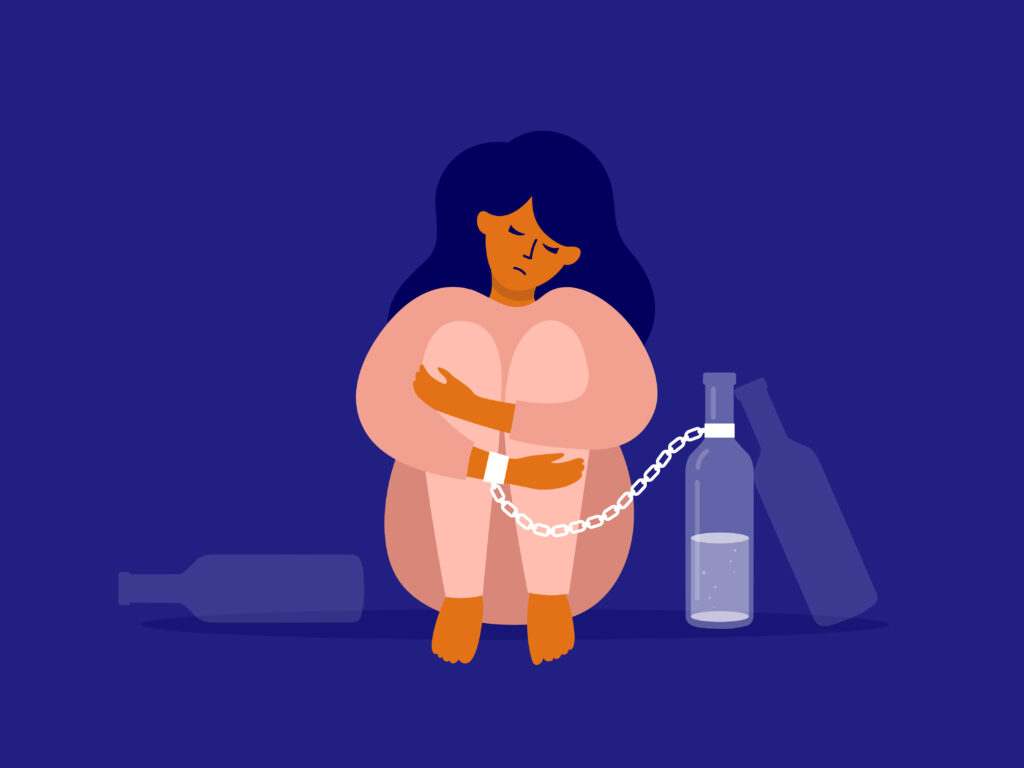Alcohol withdrawal happens when a person who has been drinking heavily for an extended period suddenly reduces or stops their alcohol intake. This abrupt change can lead to a variety of physical and psychological symptoms as the body adjusts to the absence of alcohol.
Alcohol has a way of slowing down the central nervous system, and when you use it for a long time, your body starts relying on it to stay in balance. When you suddenly reduce or stop drinking alcohol, your nervous system becomes overactive, which can cause withdrawal symptoms. It’s important to have a good grasp on what alcohol withdrawal means, if you want to break free from dependence and take charge of your life again.
What Are the Symptoms of Alcohol Withdrawal?
The symptoms of detoxing from alcohol can vary greatly. It depends on several factors such as the amount of alcohol consumed, the duration of alcohol use, and a person’s unique health conditions.
Common symptoms include anxiety, tremors, sweating, nausea, and irritability. In more severe cases, people may experience hallucinations, seizures, and delirium tremens (DTs), which is a life-threatening condition characterized by confusion, rapid heart rate, and high blood pressure.
Early recognition of these signs is important for getting the right medical help and support.

Timeline of Alcohol Withdrawal Symptoms
So, how long does alcohol withdrawal last? An alcohol detox timeline can vary, but generally, symptoms begin within a few hours to a couple of days after the last drink.
Acute withdrawal is the first stage. Within 6–12 hours, symptoms like nervousness, insomnia, and mild tremors usually start to show up. Symptoms may get worse as withdrawal goes on, reaching their worst point 24–72 hours after the last drink.
During this peak phase, you may experience severe symptoms such as hallucinations, seizures, and DTs. After the peak phase, symptoms gradually begin to subside over the next few days to a week.
However, some people continue to experience psychological symptoms such as anxiety and depression for several weeks or even months, a type of alcohol withdrawal syndrome known as post-acute withdrawal syndrome (PAWS).
What Causes Alcohol Withdrawal?
With addiction, the body needs alcohol to keep working normally, which leads to alcohol withdrawal. Brain chemistry changes when people drink booze for a long time, especially neurotransmitters that control behavior and mood.
Alcohol enhances the effects of the neurotransmitter gamma-aminobutyric acid (GABA), which has a calming effect on the brain. At the same time, it stops glutamate from working, which is a stimulating chemical. When people drink alcohol for a long time, their brains adjust by making less GABA and more glutamate.
When someone stops drinking alcohol suddenly, this balance is thrown off, which makes the nervous system work too hard and causes withdrawal signs to start. The seriousness of withdrawal can be affected by things like how long and how much you drank, your genetics, and any health problems you already have.
Treatment Options for Alcohol Withdrawal
Treating alcohol withdrawal effectively requires both the physical and mental aspects of the condition to be taken into account. People who have serious symptoms or a history of problems during withdrawal often need to be supervised by a doctor, no matter how long alcohol withdrawal does last.
In a medical setting, healthcare providers can administer medications such as benzodiazepines to reduce anxiety, prevent seizures, and stabilize vital signs. Other medications, like antipsychotics for psychosis or anticonvulsants for seizures, may be used to treat certain symptoms.
Along with medical care, psychological assistance is very important during withdrawals from alcohol. Therapy and counseling can help people deal with the mental challenges of withdrawal and get to the root causes of their alcoholism. Cognitive-behavioral therapy (CBT) helps people come up with ways to deal with cravings and stay sober. Support groups, like Alcoholics Anonymous (AA), bring together people who have been through similar challenges to help and encourage each other.

Preventing Alcohol Withdrawal
To stop alcohol withdrawal, you need to use a variety of methods that work to reduce alcohol consumption and support long-term recovery. Gradually cutting back on booze while under medical supervision can help lessen withdrawal symptoms and lower the risk of serious problems. Healthcare professionals can make a tapering plan that slowly lowers the amount of alcohol a person drinks, giving the body time to adjust.
Education and understanding are also important. People should know the risks of heavy drinking and what might happen if they stop drinking all of a sudden. Access to resources such as counseling, support groups, and rehabilitation programs can provide the necessary support for people to reduce their alcohol consumption safely.
People who have had severe withdrawal symptoms in the past or who have other health problems may have to go to an inpatient treatment center. They can targeted care in an organized setting through these programs, which offer medical supervision, counseling, and support services. People who have more than one mental health problem or who don’t have enough help at home tend to benefit the most from inpatient programs.
Seeking help for Alcohol Withdrawal
Seeking help for alcohol withdrawal is a crucial step towards recovery and reclaiming your life from alcohol dependence. It may seem like a cliché, but the first step is acknowledging the problem and reaching out for support.
While there is no hard and fast rule for how long alcohol withdrawal lasts, it can be a difficult and emotional process. Friends and family members play a vital role in providing emotional support and encouragement. Loved ones need to be informed about alcohol withdrawal and the challenges of healing to help in the best way possible.
In addition to doctors, counselors and therapists can offer psychological support and help people develop coping strategies to manage cravings and prevent relapse. Support groups such as AA provide a valuable community of people who share similar experiences and challenges. These groups offer a safe space to share feelings, gain insights, and receive encouragement from others on the same journey. The sense of community and mutual support can be incredibly motivating and help people stay committed to their recovery goals.
Perhaps the most crucial way to seek help, however, is from a treatment center like Her Harbor. Here, we provide comprehensive, trauma-informed recovery for women in recovery from alcohol addiction. If you’re ready to start the next chapter of your life, reach out to our admissions team today to get the process started.
How to Get Help
If you or someone you know is seeking trauma-informed care for mental health and substance abuse, Her Harbor provides a compassionate and comprehensive approach to recovery. Our dedicated team is trained in trauma-informed practices, offering a range of services from residential treatment to outpatient support. Contact Her Harbor today to learn more about how we can support you or your loved one on the path to healing and recovery. Together, we can navigate trauma and substance abuse with care, understanding, and hope.

Ronica is a licensed marriage and family therapist with a master’s degree in counseling psychology and a minor in addiction studies. Her personal experiences with addiction—having supported numerous family members and friends battling the disease—have deeply informed her professional approach, emphasizing the connection between mental health and addiction.
